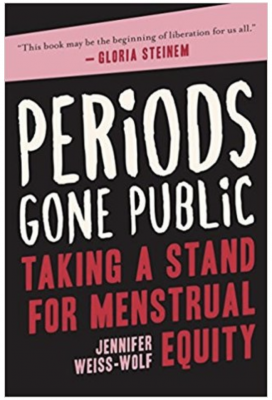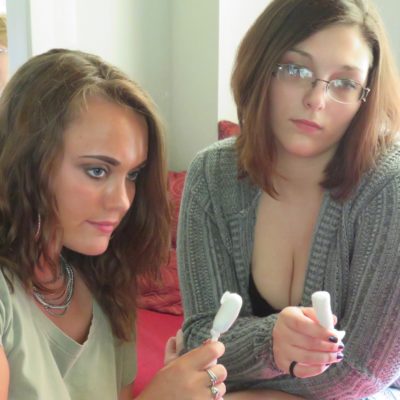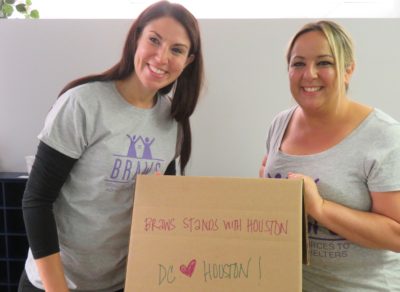Periods Gone Public: Taking a Stand for Menstrual Equity
 (Nov 2017) “Tampons and sanitary towels . . . have always been considered a luxury. That isn’t by accident, that’s by design of an unequal society, in which the concerns of women are not treated as equally as the concerns of men.” – Stella Creasy, Member of British Parliament
(Nov 2017) “Tampons and sanitary towels . . . have always been considered a luxury. That isn’t by accident, that’s by design of an unequal society, in which the concerns of women are not treated as equally as the concerns of men.” – Stella Creasy, Member of British Parliament
I was fortunate to hear author Jennifer Weiss-Wolf talk about her book and her advocacy at Bards Alley in Vienna, VA, on Nov. 28th. The next day I was on a panel of women and girls giving a briefing on menstrual equity issues on Capitol Hill in Washington, DC, to legislative staff members in the offices of Senator Tim Kaine, Senator Cory Booker and Congressman Gerry Connolly. Rep. Grace Meng made opening remarks and addressed the strides New York City has made in putting these sanitary hygiene products in public schools, homeless shelters and prisons free of charge. The work of Council Member Julissa Ferreras-Copeland of the New York City Council was instrumental in passing a bill in June of 2016 that was the first of its kind in the country.
 Two young women on the panel, Ashley (24) and Jennifer (22) talked about their lack of access to needed menstrual supplies when they were incarcerated in jail. (They are both in a Virginia based re-entry program for formerly incarcerated women, Friends of Guest House.) They had to ask guards for pads, and it was up to the guards as to who got how many and when they received them. Requests were handled at the guards’ discretion and at their convenience. Ashley and Jennifer recreated for the hearing room a demonstration of how they made “prison tampons” out of substandard pads because they were more effective than the cheap flimsy pads. Being caught with a “prison tampon” was considered having contraband for which the prisoner could be charged.
Two young women on the panel, Ashley (24) and Jennifer (22) talked about their lack of access to needed menstrual supplies when they were incarcerated in jail. (They are both in a Virginia based re-entry program for formerly incarcerated women, Friends of Guest House.) They had to ask guards for pads, and it was up to the guards as to who got how many and when they received them. Requests were handled at the guards’ discretion and at their convenience. Ashley and Jennifer recreated for the hearing room a demonstration of how they made “prison tampons” out of substandard pads because they were more effective than the cheap flimsy pads. Being caught with a “prison tampon” was considered having contraband for which the prisoner could be charged.
Weiss-Wolf talks about her own dawning awareness of how many women in this country and around the world are impacted by the lack of access to the basic hygiene products that menstruation management requires. It affects women’s ability to get an education, to work, and to fully engage in productive daily activities. Factors like poverty, homelessness and incarceration leave many women and girls without access to products that are as necessary as toilet paper and soap – which are mandated by law to be in public restrooms.
The author talks about 2016 as “The Year of the Period.” From her own New Year’s Day thunderbolt to the Women’s March on January 21, 2017, to the trips she made to other parts of the world to research what was being done to address the issue of meeting women’s basic needs so we can fully function in society every day of the year.
Menstrual Equity is on the agenda of cities and states around the country, as well as in countries around the world with populations of women and girls living in poverty. There has been some innovation in place like India around creating small businesses that manufacture pads the poor women can afford. It also creates jobs for them.
In this country, there is a movement to roll back “The Tampon Tax” that places another financial burden on top of the expense of buying these products every month Since only people who menstruate use these products, only those people are paying the tax. The book also addresses the fact that transgender men and gender non-conforming individuals also menstruate. We need to move away from the term “feminine hygiene products” and call them menstrual hygiene products. This is less about a gender binary than acknowledging it as an issue of civil rights and basic human rights.
Weiss-Wolf also addresses the need to have better testing and full labeling on what is in the tampons women are using. Potentially toxic chemicals or artificial fibers need to be tested and consumer informed. She also points out that there is an environmental impact to providing more disposable products to more women around the world. Even bio-degradable products will take longer to breakdown than the lifespan of the people who have used them. Greater innovation needs to take place around how development menstrual management products that don’t have an adverse impact on the planet.
 Locally here in Northern Virginia, Holly Seibold has founded BRAWS: Bringing Resources to Aid Women’s Shelters. This organization does product drives and distributes products to shelters and schools around the DC Metro area. They are also engaged in issue advocacy around Menstrual Equity. Delegate Jennifer Boysko is sponsoring two bills in Virginia’s 2018 legislative session, HB24 and HB25, that will address the elimination of “The Tampon Tax.”
Locally here in Northern Virginia, Holly Seibold has founded BRAWS: Bringing Resources to Aid Women’s Shelters. This organization does product drives and distributes products to shelters and schools around the DC Metro area. They are also engaged in issue advocacy around Menstrual Equity. Delegate Jennifer Boysko is sponsoring two bills in Virginia’s 2018 legislative session, HB24 and HB25, that will address the elimination of “The Tampon Tax.”
I highly recommend this book as one everyone should read – men, women and children. We need to remove the stigma around discussing periods. Men and boys should understand this very natural and normal bodily function and should support menstruating individuals by advocating for greater access to menstrual hygiene products for those who need them. It is past time for our culture and our society to normalize that people have periods – every month – for most of their lives. I urge being informed and being an advocate on this issue.